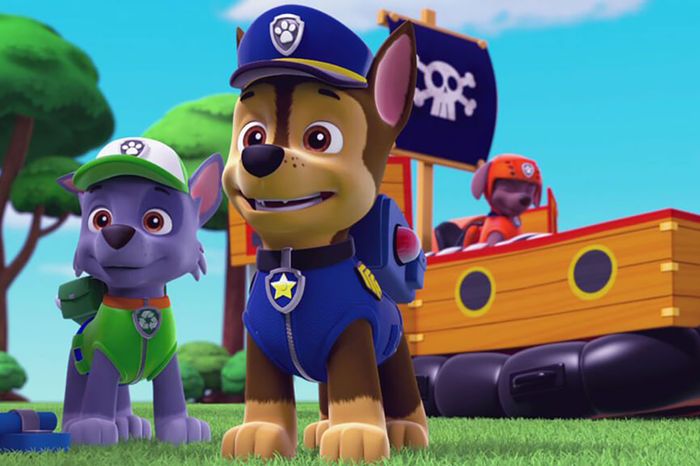
We’re republishing this story from December 18, 2019 as a reminder that, despite what the White House Press Secretary has said, Paw Patrol is not cancelled.
Let’s start with the redeeming qualities. First, the honorable mayor of Adventure Bay is a woman of color. Second, the gray dog named Rocky is really into recycling. Otherwise, Paw Patrol is a moral and aesthetic catastrophe.
My wife and I did our best to shield our sons, now 4 and 6 years old, from screen time for as long as possible. For the first kid, that meant no TV for two years. For the second, we almost made it a full six weeks. We started them on our nostalgic favorites — Sesame Street and Daniel Tiger’s Neighborhood (a spinoff of Mister Rogers’) — and were pleasantly surprised that these shows came across as funny, caring, and true. Then we entered the uneasy in-between years when the boys no longer tolerated Elmo but weren’t yet ready for superheroes who murder murderers. And so the JV superheroes made their maniacal entrance into our lives, wrapped in a whirlwind of strobe lights and talking dogs and bowling-pin sound effects.
It’s not the logic of Paw Patrol that bothers me. Does it make sense that the dogs can talk but the cats and chicken can’t? Or that the dogs can operate complex machinery without opposable thumbs? Or that Marshall the Dalmatian personally carries on his body at all times an apparently inexhaustible supply of water? No — but cartoons don’t have to make sense. We’re fine with anthropomorphized animals who wear tops but no bottoms. And to be fair, there are kids’ shows with far more puzzling internal contradictions. Take the theme song of the (vastly superior) PJ Masks, the lyrics to which read “Cuz bedtime / Is the right time / To fight crime” when obviously the line should be “Cuz nighttime / Is the right time / To fight crime”! What could possibly explain such an oversight? Nothing nearly so baffling happens in Paw Patrol.
And yet Paw Patrol is monstrous. First, there is the show’s disdain for anything remotely edifying. Sesame Street, Daniel Tiger, PJ Masks and even the openly fascistic Thomas & Friends build their story lines around minor conflicts that provide opportunities to teach life lessons in amusing ways. Lessons like Try new things or Be kind to others or (in the case of Thomas) Suppress your individuality for the sake of the greater good. But not Paw Patrol. It’s one of the few children’s programs that neither tries to entertain parents nor encourages kids to become better people.
Paw Patrol follows the adventures of a canine emergency-response team, yet it offers zero guidance as to how one should behave during an emergency. Instead of finding clever ways to teach kids everyday virtues, the writers simply throw a rescue dog at every problem. Does a farmer need to harvest his crop? Does a restaurateur need to throw a party? Toss in a rescue dog. If Marshall the Dalmatian Firedog is around, why not teach kids what to do if they smell smoke? As long as Rubble the English Bulldog Manual Laborer is on the scene, why not show kids how to practice safety around hand tools?
Even if the show were not callously amoral, it is physically unpleasant to take in. Set aside the horrid theme song and the ghoulish laughter that punctuates bad puns children can’t yet understand. Before Chase the Police Dog (a cheerful German Shepherd) can help anyone, he must first announce “Chase is on the case!” and then launch himself down a twisty slide while lights flash and an unseen chorus screams “Paw Patrol! Go go go go go go go! Paw Patrol! Go go go go go go go! Chase! Go go go go go go go! PAaw Patrol, Paw Patrol!” followed by ten solid seconds of sirens, revving engines and more flashing lights.
One last thing: the main cast of Paw Patrol features roughly a thousand boy dogs and exactly one girl dog. And, no, Everest and the Mighty Twins don’t count. Skye is the only girl dog who is always around. And she’s a cockapoo. Whose costume is entirely pink. Yes, Skye, the solitary female cast member of Paw Patrol, is a tiny, fluffy, self-deprecating, emotionally demonstrative member of a toy breed, who is consistently praised for her graciousness and excellent memorization skills. Why couldn’t the one girl dog be a firefighter or a cop? Come to think of it, even the adult female mayor relies on a 10-year-old white boy to solve all her problems. This show is utter filth. My children love it.
Brian Platzer is the author of the forthcoming novel The Body Politic (Atria Books; March 3, 2020)
*A version of this article appears in the December 23, 2019, issue of New York Magazine. Subscribe Now!

